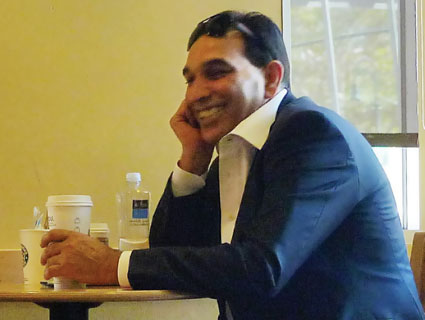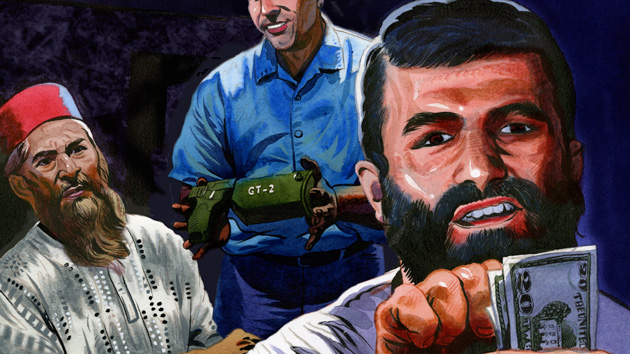How exactly does the FBI use informants to trace and trap terrorism suspects? These excerpts from the hundreds of pages of legal documents and surveillance transcripts reviewed for this project reveal the inner workings of a federal terror sting.
I Spy for the FBI: Ex-informant Craig Monteilh shed some light on how the FBI recruits undercover sources in a lawsuit he filed against the agency. (He alleges that it blew his cover.) After posing as a white supremacist and Russian hit man, Monteilh was enlisted to play a French-Syrian Muslim so he could look for radical Islamists in Southern California. To facilitate his role, he claims, the Department of Justice gave him “special permission…to engage in jihadist rhetoric” and initiate “conversations to further terrorist acts against the United States.”
Armed with this special dispensation, Monteilh says he began “spying on the Islamic community” using “cutting edge and sophisticated electronic surveillance devices.” He also maintains that the FBI told him he should try “dating Muslim women and engaging in sexual relations with Muslim women.”
Undercover Brother: The career of superinformant Shahed Hussain provides more details of how a successful undercover FBI source operates. In 2003, Hussain helped set up a sting that pulled in Mohammed Hossain, a pizzeria owner in Albany, New York, and Yassin Aref, a local imam. As part of the operation, Hussain claimed to be providing weapons to his “mujahid brothers” and showed Hossain a Stinger missile. In this transcript of one of their secretly recorded conversations, Hossain seems to balk. Hussain is quick to reassure him.
In a deposition before the Hossain and Aref’s trial, a defense lawyer asked FBI Special Agent Timothy Coll what had made Hussain (referred to as “Malik”) a good informant.
Money Bomb: In 2008, Hussain befriended James Cromitie, who expressed an interest in attacking synagogues. In one conversation Hussain secretly recorded, Cromitie describes the “terrorism movies” he’d been watching. (Hussain is identified as “CI,” the confidential informant.)
Hussain offered to assist Cromitie and three coconspirators, claiming that they would receive money and cars in exchange for carrying out their plot. In one secretly recorded conversation, he told Cromitie that he would receive “jihad money” from “the organization.”
On the stand at Cromitie’s trial, Hussain insisted that when he mentioned a $250,000 payment to Cromitie, he was in fact dropping a code word for the attack—a code word he conceded Cromitie was not aware of.
While setting up the Cromitie sting, Hussain made dozens of clandestine recordings. However, during the trial it emerged that he had failed to record a crucial conversation in which he and Cromitie discussed their final arrangements. Cromitie’s lawyer was incredulous: “You taped hundreds of hours of conversations and this most important meeting of the entire eleven-month odyssey you didn’t tape?” Hussain said the FBI told him not to.
Pledge of Allegiance: In the high-profile Liberty City Seven sting, an informant administered a fake Al Qaeda oath to the suspects in a plot to blow up Sears Tower. In a transcript of alleged ringleader Narseal Batiste taking the oath, he seemed a little unclear on the concept. (The informant is identified as “CW,” the confidential witness.)
Louder Than Bombs: Informants may also aid suspects by setting up phony arms deals or providing nonfunctioning weapons and explosives. The informant who helped 22-year-old Derrick Shareef with his plan to set off grenades in an Illinois mall arranged a meeting with an undercover FBI agent who agreed to give Shareef, who was broke, four grenades and a gun in exchange for his stereo speakers. The complaint filed against Shareef detailed how the speakers-for-arms deal went down.
Trust Issues: One downside to undercover stings is that they may make suspects involved in other stings nervous. That’s what happened when Antonio Martinez heard about the FBI’s takedown of a Portland terrorist cell. Martinez became suspicious of the undercover FBI agent (“the UC”) he’d been introduced to by an informant. However, he didn’t realize that the informant was an informant and shared his concerns with him. (The informant is referred to as the “CHS,” the confidential human source.)
Can You Hear Me Now? Successful stings often conclude with suspects thinking they’re on the verge of realizing their plots. Mohamed Mohamud planned to set off a car bomb at a 2010 Christmas tree lighting event in Portland, Oregon. Undercover FBI agents supplied him with a van holding a dummy bomb he believed would be activated by a mobile phone. Mohamud bought their deception until the end: When the bomb failed to detonate, the agents (identified as “UCEs,” undercover employees) convinced him poor cell phone reception was to blame.

















